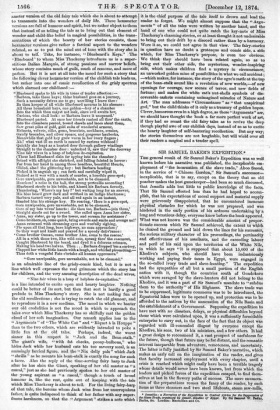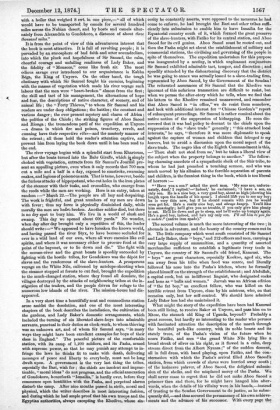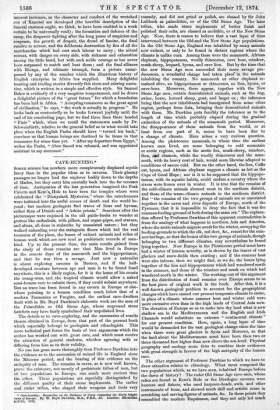SIR SAMUEL BAKER'S EXPEDITION.*
THE general result of Sir Samuel Baker's Expedition was so well known before his narrative was published, the inexplicable em- ployment of "the incarnation of the slave trade," Aboo Saood, in the service of "Chinese Gordon," Sir Samuel's successor— inexplicable, that is to say, except on the theory that an old poacher makes the best gamekeeper—had been so much discussed, that Ismailia adds but little to public knowledge of the facts. That Sir Samuel effected less than he had hoped to accom- plish, that his expectations of moral support and material supply were grievously disappointed, that he encountered immense physical obstacles for which he was not prepared, and was hindered in the early portion of his arduous undertaking by a long and vexatious delay, everyone knew before the book appeared. What was not known was the considerable amount of propor- tionate success which Sir Samuel achieved, the extent to which he cleared the ground and laid down the lines for his successor, the serious military character of his proceedings, the pertinacity and effectiveness of his assailants, and the exceeding labour and peril of his raid upon the territories of the White Nile, in which he says "it is supposed that about 15,000 of the Khedive's subjects, who should have been industriously working and paying their taxes in Egypt, were engaged in the so-called ivory trade and slave-hunting." The expedition had the sympathies of all but a small portion of the English nation with it, though the countries south of Gondokoro which were ravaged by the slave-hunters did not belong to the Khedive, and it was a part of Sir Samuel's mandate to "subdue them to the authority" of His Highness. The slave trade was to be suppressed, legitimate commerce was to be introduced, the Equatorial lakes were to be opened up, and protection was to be afforded to the natives by the annexation of the Nile Basin and the establishment of a Government. Supposing the expedition to have met with no disasters, delays, or physical difficulties beyond those which were calculated upon, it was a sufficiently formidable enterprise to carry out, in the face of the fact that its object was regarded with ill-concealed disgust by everyone except the Khedive, his sons, two of his ministers, and a few others. It had a great design to recommend it, a vast prospect of usefulness for the future, though that future may be far distant, and the romantic interest inseparable from adventure, remoteness, and uncertainty. The latter is fully justified by Sir Samuel Baker's narrative, which makes an early call on the imagination of the reader, and gives that faculty increased employment with every chapter, until a crisis is reached which might easily have been a terrible tragedy whose details would never have been known, but from which the leaders and picked forces of the expedition escaped, to find them- selves at last in the flowery paths of success. The mere enumera- tion of the preparations rouses the fancy of the reader, by such items as three steamers and two steel lifeboats, steam saw-mills, hanailia ; a Narrative of the Erpedttlon to Central Africa for the Suppression of the Slave Trade, organised by Ismail, Khedive of Egypt. By Sir kiamuel W. Baker, Pacha, ko. London: Macmillan and Co. with a boiler that weighed 8 cwt. in one piece,—" all of which would have to be transported by camels for several hundred miles across the Nubian desert, and by boats and camels alter- nately from Alexandria to Gondokoro, a distance of about three thousand miles."
It is from the point of view of this adventurous interest that the book is most attractive. It is full of revolting people ; it is pervaded by an atmosphere of bad faith and utter scoundrelism, into which the pluck and hopefulness of Sir Samuel, the calm, cheerful courage and unfailing readiness of Lady Baker, and the fidelity of " Idonsoor," come like fresh air. The most odious savage ever introduced to our acquaintance is Kabba Bega, the King of Unyoro. On the other hand, the tough obstinacy with which Sir Samuel fought his enemies, beginning with the masses of vegetation which made his river voyage such labour that the men were " heart-broken " almost from the first; the skill and tact of his management, the alternations of hope and fear, the descriptions of native character, of scenery, and of animal life ; the "Forty Thieves," to whom Sir Samuel and his readers are under deep obligations ; the battles ; the constant and various danger ; the ever present mystery and charm of Africa ; the politics of the Chiefs ; the striking figures of Aboo Saood and Rionga, ; the tremendous peril of the expedition at Unyoro —a drama in which fire and poison, treachery, revolt, and cunning have their respective roles—and the masterly manner of the retreat ; all these hold the reader's attention captive, and prevent him from laying the book down until it has been read to the end.
The river voyage begins with a splendid start from Khartoum, but after the boats turned into the Bahr Giraffe, which itsimply choked with vegetation, extracts from Sir Samuel's Journal pre- sent an appalling picture, even when it only records that 700 men cut a mile and a half in a day, exposed to sunstroke, swarming snakes, and legions of poisonous ants. That is tame, however, beside the furious attacks of hippopotami, who cut holes in the iron plates of the steamer with their tusks, and crocodiles, who emerge from the reeds while the men are working. Here is an entry, taken at random :—‘, March 22.—The people are all lazy and despairing. The work is frightful, and great numbers of my men are down with fever; thus my force is physically diminished daily, while morally the men are hart-broken. Another soldier died, but there is no dry spot to bury him. We live in a world of slush and swamp. This day we opened about 600 yards." No wonder, when day after day brought only a repetition of this, the leader should write:—" We appeared to have forsaken the known world, and having passed the river Styx, to have become secluded for ever in a wild land of our own, where all were enemies like evil spirits, and where it was necessary either to procure food at the point of the bayonet, or to lie down and die." The fight with the morass-river and the great beasts is speedily succeeded by fighting with the hostile tribes, for Gondokoro was the depot for slaves and the rendezvous of the slave-hunters. A prosperous voyage on the White Nile, enlivened by antelope-shooting when the steamer stopped at forests to cut fuel, brought the expedition to the much-changed station, where they found all desolate, the villages destroyed by the attacks of neighbouring tribes at the in- stigation of the traders, and the people driven for refuge to the numerous low islands of the river. The mission-house had dis- appeared.
In a very short time a beautifully neat and commodious station arose amidst the desolation, and one of the moat interesting chapters of the book describes the installation, the cultivation of the gardens, and Lady Baker's domestic arrangements, which included the turning of six liberated slave-boys into admirable servants, punctual in their duties as clock-work, to whom thieving was an unknown art, and of whom Sir Samuel says, "in many ways they might have been excellent examples for boys of their class in England." The peaceful picture of the comfortable station, with its camp of 1,200 soldiers, and its Paaha, armed with supreme power, so that he may punish any attempt to in- fringe the laws he thinks fit to make with death, delivering messages of peace and liberty to everybody, must not be long dwelt upon. A government is the very last thing the tribes, especially the Bari, wish for ; the chiefs are insolent and imprac- ticable, "moral ideas" do not progress, and the official annexation of Gondokoro, henceforth "Ismailia," is hardly over, before they commence open hostilities with the Pasha, and perpetual alarms disturb the camp. After nine months passed in strife, moral and physical, which the writer describes in most interesting fashion, and during which he had ample proof that his own troops and the Egyptian authorities, always excepting the Khedive, whose sin- cerity he constantly asserts, were opposed to the measures he had come to enforce, he had brought the Bari and other tribes suffi- ciently into submission to enable him to leave Ismailia for the Equatorial country south of it, which formed the great preserve of the slave-hunters, with Fatiko for its central station, and Aboo Saood for its evil genius. Aboo Saood must be rooted out, and then the Pasha might set about the establishment of military and commercial stations, the civilising and governing of the people in spite of themselves. The expedition undertaken for this purpose was inaugurated by a mutiny, in which unpleasant conjuncture Sir Samuel exhibited admirable tact, temper, and discretion ; and speedily attended by the disheartening discovery that the district he was going to annex was actually leased to a slave-trading firm, represented by Aboo Saood, by the Government of the Soudan ! The reiterated assurances of Sir Samuel that the Khedive was ignorant of this nefarious transaction are difficult to resist, but when we peruse the after-story which he tells, when we find that his letters to the Khedive remained unanswered, and remember that Aboo Saood is "in office," we do resist them somehow, and look with additional interest for "Chinese Gordon's" report of subsequent proceedings. Sir Samuel is rather comical about the native notion of the suppression of kidnapping. He soon dis- covered that it was bad policy to descant to the chiefs upon the suppression of the "slave trade" generally ; "this attacked local interests," he says, "therefore it was more diplomatic to speak against the capture of women and children that belonged to my hearers, but to avoid a discussion upon the moral aspect of the slave trade. The negro idea of the Eighth Commandment is this, —' Thou shalt not steal from me,' but he takes a liberal view of the subject when the property belongs to another." The follow- ing charming anecdote of a sympathetic sheik of the Shir tribe, to whom he had just preached a touching sermon, and who was much moved by his allusion to the forcible separation of parents
and children, is the funniest thing in the book, which is too liberal of horrors :—
" Have you a son ?' asked the good man. 'My sons are, unfortu- nately, dead; I replied.'—' Indeed,' ho exclaimed ; 'I have a son, an only son. He is a nice boy, a very good boy, about so high (showing his length upon the handle of his spear). I should likb you to see my boy; he is very thin now, but if ho should remain with you he would soon get fat. He's a really nice boy, and always hungry. You'll like him amazingly ; he'll give you no trouble, if you only give him plenty to eat. He'll lie down and go to sleep, and he'll wake up hungry again. He's a good boy, indeed, and he's my only son. I'll sell him to you for a molote I' (native iron spade)."
The second volume is much the more interesting of the two ; it abounds in adventure, and the beauty of the country comes out in it. The little company which went south consisted of Sir Samuel and Lady Baker, their "boys," and 212 officers and men, carrying a very large supply of ammunition, and a quantity of assorted merchandise sufficient to establish a legitimate ivory trade in Unyoro, the country of Sir Samuel's old friend, Kamrasi. The " boys " are great characters, especially Kookoo, aged six, who ran away from his tribe when food was scarce, and literally followed his nose into the Pasha's kitchen, where he formally placed himself on the strength of the establishment ; and Abdullah, a capital cook, but an indifferent linguist, who designated cocks and hens as "bulls and women." Jarvah was an African edition of "the fat boy," an excellent fellow, who was killed on the terrible retreat from Unyoro, close by his mistress, who, on that occasion only, lost her self-control. We should have admired Lady Baker less had she maintained it.
What might the story of the expedition have been had Kararasi been still living, to receive Baker at Unyoro, and pass him on to Mtese, the staunch old King of Uganda, beyond? Probably a great success, but hardly so interesting to the reader who peruses with fascinated attention the description of the march through the beautiful park-like country, with its noble beasts and its stately trees, of the Pasha's vision of the future when he nears Fatiko, and sees "the grand White Nile lying like a broad streak of silver on his right, as it flowed in a calm, deep stream direct from the Albert Nyanza ;" of the sudden descent, all in full dress, with band playing, upon Fatiko, and the con- sternation with which the Pasha's arrival filled Aboo Saood's station, from which crowds of slaves were hurried away south ; of the insincere palaver, of Aboo Saood, the delighted submis- sion of the sheiks, and the misplaced mercy of the Pasha. We shall never cease to regret that he did not make Aboo Saood a prisoner then and there, for he might have hanged him after- wards, when when the details of his villainy were in his hands,—instead of trusting to the Soudan Government to do justice, as he subse- quently did,—and thus secured the permanency of his own achieve- ments and the advance of his successor. With every page the
interest increases, as the character and conduct of the wretched son of Kamrasi are developed (the horrible description of the funeral customs ought, we think, to have been omitted in a work certain to be universally read) ; the formation and defence of the camp, the desperate fighting after the long pause of suspicion and suspense, the growth of despair, the dread of famine, the final resolve to retreat, and the deliberate destruction by fire of all the merchandise which. had cost such labour to carry ; the actual retreat, with danger on every side, with sickness and exhaustion among the little band, but with such noble courage as has never been surpassed to match and beat them ; and the final alliance with Rionga, and ultimate triumph, form a picture unsur- passed by any of the number which the illustrious history of English enterprise in Africa has supplied. Many delightful hunting and trading stories diversify this stern and stirring narra- tive, which is written in a simple and effective style. Sir Samuel Baker is evidently of a very sanguine temperament, and he draws a delightful picture of the "great future" for which a foundation has been laid in Africa. "Accepting commerce as the great agent of civilisation," he says, "the work is actually in progress." He looks back as contentedly as he looks forward joyfully until the end of his concluding page, but we find three lines there headed " Finis " which, when we recall the statements made by Dr. Schweinfiirth, relative to the general belief as to what would take place when the English Pasha should have "turned his back," convince us that human beings are destined to be items in that commerce for some time yet. "After my departure from Egypt," writes the Pasha, " Aboo Saood was released, and was appointed assistant to my successor."








































 Previous page
Previous page